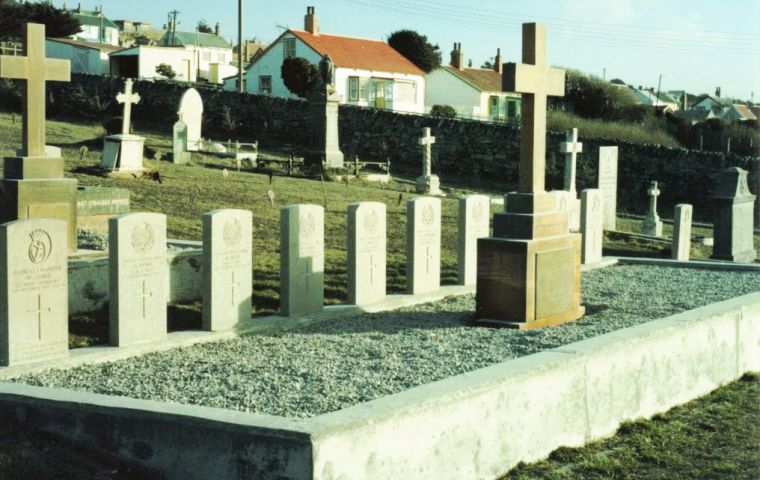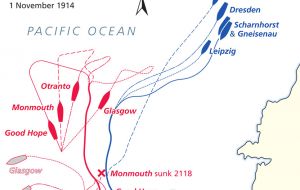MercoPress. South Atlantic News Agency
Falklands cemetery to share First World War medical records
 Eleven seamen who died defending the Falklands in the First World War are commemorated at Stanley Cemetery.
Eleven seamen who died defending the Falklands in the First World War are commemorated at Stanley Cemetery.  Coronel represented Britain’s first naval defeat for a century when it occurred off the coast of Chile in November 1914. Losses were over 1.650
Coronel represented Britain’s first naval defeat for a century when it occurred off the coast of Chile in November 1914. Losses were over 1.650 Interactive information technology providing details of how seamen lost their lives defending the Falkland Islands during the First World War will be unveiled at Stanley Cemetery in the capital on Monday 8 December.
Visitors with smartphones can scan the interactive new panel to access medical records and personal stories of the casualties of the naval battle, many of whom are now commemorated at the cemetery.
The fatal injuries, many related to severe burns from the shelling of their ships, were originally recorded in a medical report drafted by a fleet surgeon at Port Stanley for the Admiralty in London.
Andy Stillman, 1914-1918 Commemorations Project Manager at the Commonwealth War Graves Commission, said: “During the centenary of the First World War, over 500 visitor information panels are being installed globally to add depth to the public’s understanding of the conflict and the casualties we commemorate.”
“The panel at Stanley Cemetery was delivered by the RAF and it covers both the Battle of the Falkland Islands and the Battle of Coronel.”
Coronel represented Britain’s first naval defeat for a century when it occurred off the coast of Chile in November 1914. The defeat was in part ‘avenged’ on 8 December 1914, when a strong Royal Naval force successfully defended the Falklands from German raiders intent on attacking its valuable coaling facilities.
Four British cruisers were defeated by five of German ships in the Battle of Coronel off the coast of Chile in November 1914. Old and underpowered, waterlogged by heavy seas and manned largely by reservists, the British faced impossible odds against excellent German gunnery. More than 1,650 soldiers were lost, commemorated largely on naval memories on the south coast of England.
The defeat was in part ‘avenged’ on 8 December 1914, in the Battle of the Falkland Islands, when a strong Royal Naval force successfully defended the Falklands from German raiders intent on attacking its valuable coaling facilities. Eleven British seamen and marines were killed or died later of wounds, nine of these men were laid to rest in Stanley Cemetery. A memorial to the two other men stands alongside these graves.
The CWGC’s Technical Services Officer, Joe Sipos, will unveil the panel, 100 years on from this victory at 2pm on Monday.
There will follow short speeches from Major Peter Biggs, the head of the Falklands Islands Defense Force, and Phyllis Rendell, Chair of the Islands’ 1914 Committee.
Eleven seamen who died defending the Falklands in the First World War are commemorated at Stanley Cemetery.
The CWGC maintains the graves of the 1.7 million Commonwealth servicemen and women who died during the two world wars. It also holds and updates an extensive and accessible records archive. The CWGC operates in over 23,000 locations in 153 countries across all continents except for Antarctica.




Top Comments
Disclaimer & comment rules-

Read all commentsfamily historians and genealogist will be very happy with this..
Dec 07th, 2014 - 08:13 pm 0Commenting for this story is now closed.
If you have a Facebook account, become a fan and comment on our Facebook Page!